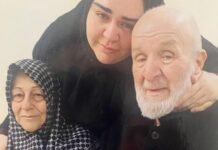The families of several women detained in a recent mass crackdown on people linked to the faith-based Gülen movement have contacted Peoples’ Equality and Democracy Party (DEM) deputy Ömer Faruk Gergerlioğlu, describing the detentions as deeply unjust.
More than 300 people were detained across multiple provinces in Turkey on the order of prosecutors in Gaziantep. Among those taken into custody were numerous women and female university students. They were accused of providing financial support to the Gülen movement and communicating with its members via encrypted messaging apps. Some were also accused of “maintaining contact with individuals affiliated with the movement who are currently abroad.”
Turkish President Recep Tayyip Erdoğan has been targeting followers of the Gülen movement, inspired by the late Muslim cleric Fethullah Gülen, since corruption investigations revealed in 2013 implicated then-prime minister Erdoğan as well as members of his family and inner circle.
Dismissing the investigations as a Gülenist coup and conspiracy against his government, Erdoğan designated the movement as a terrorist organization and began pursuing its followers. He intensified the crackdown on the movement following an abortive putsch in 2016, which he accused Gülen of masterminding. Gülen and the movement strongly deny involvement in the coup attempt or any terrorist activity.
The husband of one detainee reached out to Gergerlioğlu and said his wife was chronically ill and pregnant. “My wife Hatice, who was taken into custody and brought to Gaziantep, has heart arrhythmia. She previously had a miscarriage when she was six months pregnant, and she is currently four months pregnant. We are worried for her life and are asking for your help in this matter. We can prove her health problems with hospital reports,” he said.
The mother of a university student also described the plight of her detained child through Gergerlioğlu. “My daughter was the top student in her high school, and as a reward, her father sent her on a trip abroad. She is now in her third year of medical school. One morning she was dragged out of her dorm at 5:30 a.m. by seven police officers. During her interrogation, they asked questions like ‘Why did you go abroad?’ She has an exam on May 26, and this ordeal could set her back a year!”
According to the reporting of Turkish Minute, the detainees were questioned by the police over constitutionally protected and otherwise lawful activities, such as whether they attended certain high schools, universities or private tutoring centers; stayed in specific dormitories or shared apartments; possessed a driver’s license or passport; or participated in educational camps abroad.
Such activities, while lawful, have been used by Turkish judicial authorities as indicators of affiliation with the Gülen movement, which the Turkish government classifies as a terrorist organization.
The police and prosecutors are also demanding detailed explanations about any international travel, including who funded their trips, who they traveled with and where they stayed.
One standard question in the file asks whether the detainee “attended overseas camps” organized by the Gülen movement and, if so, “which country you traveled to, who accompanied you and who welcomed you at the airport.”
Another question asks whether the detainee participated in summer camps in countries such as Bosnia, Albania, North Macedonia, Georgia or northern Iraq, trips that in many cases took place earlier and involved no known criminal activity.
Gergerlioğlu criticized the nature of the detentions in a video he posted on X on Thursday, saying, “In this country, traveling abroad has become a crime! Going on a tourist trip has become a crime! Where are you trying to drive these young people, what are you trying to do?”
In another line of questioning, detainees are asked about their presence on social media, which messaging apps they have used (such as Signal or Jitsi) and with whom they communicated by using these apps, the names of their social media accounts, whether they had cryptocurrency wallets and if they ever transferred funds via digital platforms.
Questions also included whether they donated money under religious terms such as “zakat,” “infak” or “himmet,” practices rooted in Islamic tradition but now regularly cited as evidence of “terrorist financing” in investigations targeting Gülen followers.
In another question the detainees are asked whether any member or members of their family have been prosecuted on terrorism charges, while they were also asked about their previous workplaces and how long they worked there.
One question explicitly asks if the detainee wants to benefit from Article 221 of the Turkish Penal Code, the so-called “effective remorse” clause, which reduces sentences for those who confess and cooperate with the authorities.
Legal experts and rights groups say the scope of the questioning shows how Turkish authorities continue to treat peaceful, legal activity as acts of terrorism.
According to a statement from Justice Minister Yılmaz Tunç ahead of the eighth anniversary of the coup attempt last July, a total of 705,172 people have been investigated since the coup attempt on terrorism or coup-related charges due to their alleged links to the movement. Tunç said at the time that there were 13,251 people in prison in pretrial detention or convicted of terrorism in Gülen-linked trials.
These figures are thought to have increased over the past 10 months since the operations targeting Gülen followers continue unabated. Erdoğan and several government ministers said there would be no “slackening” in the fight against the movement following the cleric’s death at 83.
Turkey is a member of the Council of Europe and a signatory to the European Convention on Human Rights. However, international watchdogs have repeatedly warned that Ankara’s use of counterterrorism legislation violates basic legal safeguards and is being used to silence dissent and crush civil society.














